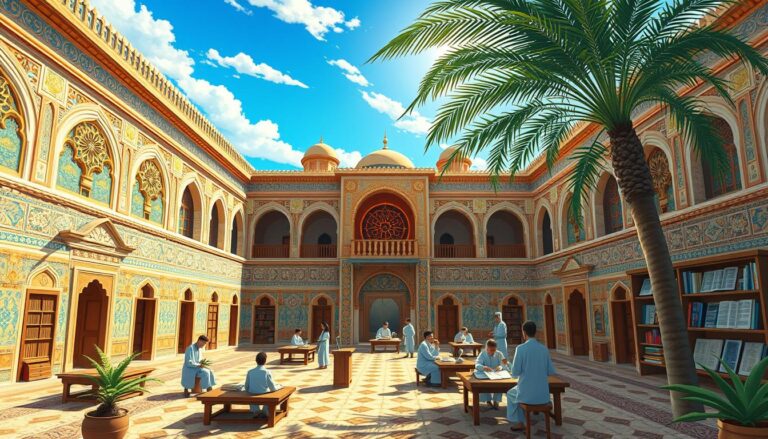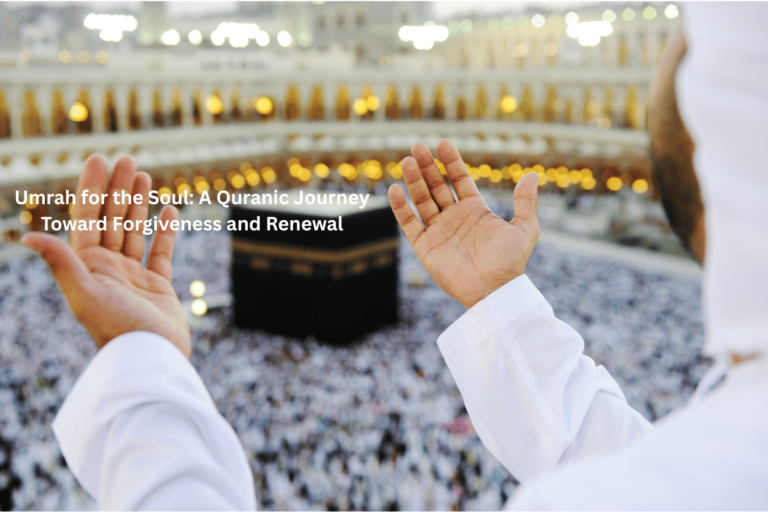What Happens After Death? The Islamic Perspective
Ever wondered what comes after our last breath? Islamic eschatology gives a special look at the soul’s journey after death. It sees death as a start to eternal life, not the end.
In Islam, death is just the start of a big change. The soul leaves the body and begins a journey Allah has planned. This belief in the afterlife guides how Muslims live, encouraging good deeds and spiritual growth.
Islamic teachings outline what happens after death. From the Angel of Death gently taking a believer’s soul to the different experience for disbelievers, these beliefs are key to Islamic faith. The soul’s journey includes stages like Barzakh, the waiting period, and the Day of Judgment.
Key Takeaways
- Islam views death as a transition to eternal life
- The soul separates from the body at the moment of death
- Angels play a role in guiding souls in the afterlife
- There are distinct experiences for believers and non-believers
- The afterlife includes stages like Barzakh and the Day of Judgment
- Belief in the afterlife influences Islamic daily life and practices
The Islamic Concept of Death and Afterlife
In Islam, death is just the start of a journey into the spiritual realm. It’s a shift from life on earth to eternal life. This view of death and the afterlife helps Muslims understand divine justice and the soul’s journey.
Death as a Transition to Eternal Life
Muslims see death as a move to eternal life, not the end. This belief guides their actions and thoughts. The Quran says every soul will be judged fairly.
The Separation of Soul from Body
When someone dies, their soul leaves their body. This happens differently for believers and non-believers. The good ones have an easy transition, while the bad ones face challenges. This marks the soul’s move to the next stage of existence.
The Role of the Angel of Death
Azrael, the Angel of Death, is key in this transition. He takes the souls of the dead to the spiritual realm. This is a step towards divine judgment.
“Every soul will taste death. Then to Us will you be returned.” – Quran 29:57
Knowing about death and the afterlife in Islam brings comfort to believers. It encourages living a life of purpose and responsibility. It shows that what we do here matters for what comes next, highlighting the value of faith and good deeds.
The Journey of the Soul After Death
In Islamic afterlife beliefs, the soul journey starts right after death. It’s a new phase, moving from the physical to the spiritual world.
The Questioning by Munkar and Nakir
When the soul enters the grave, it faces its first test. Two angels, Munkar and Nakir, ask about the deceased’s faith. Those who were righteous answer well and find peace. But sinners might struggle during this questioning.
The Life in Barzakh
After the questioning, the soul goes to Barzakh. This place is a barrier between the living and the dead. In Barzakh, souls are aware and live differently than on earth.
“Every soul shall taste of death” – Surah al-Anbiya’, Ch. 21: V.36
This verse shows death is universal and comes to all. The Quran talks about Barzakh in Surah al-Mu’minun. It explains Barzakh as a separation between life and the afterlife.
The State of Waiting Until Judgment Day
Barzakh is not the end. It’s a waiting period until Judgment Day. Souls can’t go back to their lives. The soul’s state in Barzakh depends on their deeds in life.
- Righteous souls find peace and see glimpses of Paradise.
- Sinful souls may feel discomfort, a preview of future punishment.
- All souls stay in this state until Judgment Day.
Knowing about the soul’s journey after death encourages Muslims to live righteously. It shows that actions in this life affect the next, shaping one’s eternal fate.
The Day of Resurrection (Yawm al-Qiyamah)
In Islamic eschatology, the Day of Resurrection is a key moment. It’s known as Yawm al-Qiyamah, marking the end of the world and the start of eternal life. The Quran talks about this day over 500 times, showing its big role in Islamic belief.
The Day of Resurrection starts with the angel Israfel blowing a trumpet. This sound wakes up all souls from their graves. The Quran calls this day “The Last Day” (Al-Yawm al-Aakhir) and “The Hour” (As-Saa ‘ah).
On this day, all souls come together for judgment. The Quran talks about this in Surah Al-Hajj (22:7), saying it’s sure to happen. People’s actions are weighed on scales of justice, as the Quran says in 21:47. This decides their eternal fate.
“The Day of Resurrection is the day of mutual loss and gain,” as stated in the Quran (64:9).
Islamic teachings say we should prepare for this day by living righteously and seeking forgiveness. The Prophet Muhammad taught that repentance helps in this life and the next. Remember, our actions in this world affect our fate in the hereafter.
The Final Judgment in Islam
Islamic afterlife beliefs paint a vivid picture of the Day of Judgment. This crucial event in the hereafter involves a fair assessment of each person’s deeds and ultimate fate.
The Weighing of Deeds
On Judgment Day, every soul faces a weighing of their actions. Good deeds are measured against bad ones on a divine scale. This process determines whether a person will enter Paradise or face punishment. The Quran mentions this weighing 70 times, highlighting its significance in Islamic doctrine.
The Bridge of Sirat
After the weighing, souls must cross the Sirat, a bridge spanning over Hell. This challenging passage tests the faith and deeds of each individual. Those with righteous lives pass easily, while sinners struggle or fall. The concept of Sirat emphasizes the importance of living a virtuous life in preparation for the afterlife.
Divine Justice and Mercy
Allah’s divine justice plays a central role in the final judgment. Yet, Islamic teachings also stress God’s mercy. The Quran criticizes hoarding wealth and encourages social service, suggesting that helping others can tip the scales in one’s favor. This balance of justice and compassion reflects the complex nature of Islamic afterlife beliefs.
“There is no deity but God, and Muhammad is the messenger of God.”
This fundamental profession of faith serves as a reminder of the core principles guiding Muslims through life and into the hereafter. It underscores the importance of faith and good deeds in preparing for the Day of Judgment.
Paradise (Jannah) in Islamic Belief
In Islamic beliefs, Jannah is the ultimate reward for those who lived righteously. It’s a place of eternal joy, free from pain and sadness. Those who followed Allah’s teachings and lived virtuous lives are promised a spot in this paradise.
Jannah is thought to have seven levels, each with its own material and inhabitants. The highest level, made of divine light, is where Abraham lives. This idea of multiple heavens enriches Islamic views on the afterlife.
The Quran vividly describes Jannah:
- Gardens with flowing rivers
- Abundant fruits and refreshments
- Luxurious furnishings and attire
- Companionship of loved ones
These descriptions aim to inspire and motivate believers. The promise of Jannah encourages them to do good and avoid evil during their lives on earth.
“Indeed, those who have believed and done righteous deeds – they will have the Gardens of Paradise as a lodging.” – Quran 18:107
Islamic teachings say Jannah’s beauty is beyond what we can imagine. The rewards for the faithful are said to be incomprehensible to humans. They promise eternal happiness and fulfillment in Allah’s presence.
What Happens After Death? The Islamic Perspective
Islamic eschatology paints a vivid picture of the journey after death. It outlines several afterlife stages. These stages guide Muslims in their spiritual preparation for the hereafter.
The Stages of the Afterlife
In Islamic tradition, the soul starts a profound journey after death. It begins with the soul separating from the body. Then, it faces questioning in the grave.
After that, the soul enters Barzakh, a waiting period until the Day of Resurrection. On this day, all souls will face judgment. This judgment determines their eternal fate in Paradise or Hell.
The Importance of Earthly Actions
Islam teaches that our actions in this life impact our fate in the afterlife. The Quran states:
“Whoever does an atom’s weight of good will see it, and whoever does an atom’s weight of evil will see it.” (99:7-8)
This shows the importance of living righteously and avoiding sin. Every deed, no matter how small, has weight in the divine balance.
Preparing for the Hereafter
Spiritual preparation for the afterlife is key in Islamic faith. Muslims are encouraged to:
- Perform good deeds regularly
- Seek knowledge and share it with others
- Repent sincerely for past mistakes
- Adhere to Islamic teachings in daily life
By focusing on these aspects, Muslims aim for a favorable outcome in the afterlife. This belief in accountability after death motivates them to live ethically and grow spiritually.
Hell (Jahannam) and Divine Punishment
In Islamic beliefs, Jahannam is the place of divine punishment. It’s key to understanding accountability and justice after death.
Descriptions of Hell in Islamic Texts
The Quran describes Jahannam as a place of torment. It talks about “Fire” 125 times and “Hell” 77 times. The Blazing Fire (jaḥīm) is mentioned 26 times, showing the harsh punishment.
People in Jahannam suffer from constant torment, thirst, hunger, and regret. It’s like a prison, with chains, iron hooks, and angels watching. They eat a desert plant called Ghislin and the heads of devils from the tree of Zaqqum.
The Concept of Temporary Punishment
Some Muslims think Jahannam might not be forever. Ibn Taymiyyah, a famous Islamic thinker, said Hell could be temporary. This idea fits with the idea of Divine Justice, which seeks fairness in punishment.
Sunni and Shi’a beliefs differ on Jahannam’s permanence. Sunnis usually see it as eternal. But some Twelver Shi’i believe punishment lasts because of the lasting mark of sin on the sinner’s mind.
- Major sins leading to punishment include murder, usury, and exploiting orphans
- Historical figures like Pharaoh and Abu Lahab are said to suffer in Hell
- Some believe it’s possible to be forgiven and moved to Paradise from Jahannam
Understanding Jahannam and divine punishment helps Muslims think about their actions. They aim to live righteously in their lives on earth.
The Significance of Belief in the Afterlife for Muslims
Belief in the afterlife is key to the Islamic faith. It guides Muslims’ daily lives, offering spiritual motivation and moral guidance. This belief shapes how they act in this world.
Islamic teachings say our actions in life decide our fate after death. This belief pushes Muslims to live righteously, knowing they’ll be judged for their actions. The promise of paradise for good deeds and the fear of hell for sins motivate them to act ethically.
“La ilaha illallah” (There is no god but Allah) – these words, when spoken as one’s last, are believed to grant entry into Heaven.
Death is seen as a transition to eternal life in Islam. This belief comforts those facing loss and offers hope for reuniting with loved ones. It also prompts Muslims to prepare for the afterlife through good deeds, charity, and remembering Allah.
- Belief in the afterlife is one of the six articles of faith in Islam
- Muslims strive to utter the profession of faith as their last words
- The concept of Barzakh describes the period between death and resurrection
Islamic teachings inspire believers to focus on the soul’s eternal nature. They encourage looking beyond worldly gains and growing spiritually. This belief helps Muslims understand life’s purpose and motivates them to help their communities and the world.
Islamic Practices and Rituals Related to Death
Islamic death rituals show deep spiritual beliefs and cultural traditions. They bring comfort to those grieving and honor the deceased’s journey to the afterlife. It’s important for Muslims and non-Muslims to understand these customs.
Funeral Rites in Islam
An Islamic funeral has several key steps. The body is gently washed and wrapped in simple white cloth. This is called ghusl, symbolizing purification. Burials happen quickly, often within 24 hours of death.
Prayers for the Deceased
Salaatul Janaazah, the funeral prayer, is a communal act of worship. Muslims gather to seek Allah’s mercy for the departed soul. This prayer is brief but powerful, reinforcing the belief in divine compassion and the transient nature of worldly life.
Remembrance and Charity After Death
In Islam, death doesn’t end one’s spiritual journey. Loved ones honor the deceased through prayers and charitable acts. Many families organize gatherings on the 7th and 40th days after death, as well as annually.
These events combine remembrance with good deeds, believed to benefit the departed soul.
- Reciting Quran
- Distributing food to the poor
- Making donations in the deceased’s name
These practices highlight Islam’s emphasis on community support, spiritual growth, and ongoing connection with loved ones who have passed on. Through these rituals, Muslims find solace and maintain hope in Allah’s infinite mercy.
Conclusion
The Islamic afterlife is a deep spiritual journey that shapes the lives of believers. It offers a clear view of eternal life, showing us what happens after death. Islam teaches that death is just a transition to a new life.
The Quran says our actions will be judged, with good deeds rewarded tenfold. It describes paradise as a beautiful place with seven levels, based on how we lived. On the other hand, hell is seen as a place for spiritual growth, not eternal punishment.
Islamic beliefs about the afterlife motivate Muslims to live righteously. They know their actions will be judged on the Day of Judgment. This faith brings comfort in death, knowing their journey continues beyond this world.
Though the exact nature of the afterlife is a mystery, Islam promises God’s mercy. This mercy guides the soul on its eternal journey.
Source Links
- What Happens after Death? – Islam Question & Answer
- Life After Death In Islam: The Concept And The 14 Stages Of Afterlife
- Life After Death5 min read
- Islam Guide: Life After Death
- Life after death: What happens when we die?
- The Resurrection
- The Day of Judgment and the Resurrection (Qiyama)
- Death & Day of Judgement — LEARN ISLAM
- Life After Death In Islam: What Happens After Death? – DEEN MINDER
- Islam – Eschatology, Judgment, Afterlife | Britannica
- Judgement Day in Islam
- Islamic view of death
- Imam: ‘We Can’t Imagine’ The Beauty Of Paradise After Death
- The Islamic Perspective of Life after Death
- Is the Islamic Jahannam (Hell) meant to be temporary or permanent?
- Jahannam
- Akhirah (the afterlife) – Authority in Islam – GCSE Religious Studies Revision – OCR – BBC Bitesize
- Hell – Islamic Beliefs, Afterlife, Judgment | Britannica
- Care of the Dying – Islam – HSE.ie
- The Islamic View of the Afterlife – Precious Blood Renewal Center
- Life After Death







